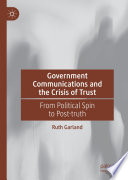Government Communications and the Crisis of Trust: From Political Spin to Post-truth 1st Edition
$50.00 Original price was: $50.00.$25.00Current price is: $25.00.
Government Communications and the Crisis of Trust: From Political Spin to Post-truth 1st Edition – Ebook Instant Download/Delivery ISBN(s): 9783030775766,9783030775759,3030775763,3030775755

Product detail:
- ISBN 10: 3030775763
- ISBN 13: 9783030775766
Author: Ruth Garland
This book opens up the black box of government communication during the age of political spin, using archival and official documents, memoirs and biographies, and in-depth interviews with media, political and government witnesses. It argues that substantive and troubling long-term changes in the ways governments manage the media and publicly account for themselves undermine the public consent essential to democracy. Much of the blame for this crisis in public communication has been placed at the feet of politicians and their aides, but they are just part of the picture. A pervasive ‘culture of mediatization’ has developed within governments, leading to intended and unintended consequences that challenge the capacity of central public bureaucracies to implement public values and maintain impartiality. It concludes that public servants, elected officials and citizens have an important role to play in accounting for governments’ custodianship of this most politically-sensitiveof public goods – the public communications function.
Table of contents:
- 1. Prologue: The Crisis of Trust
- Part I. The Post-War Government Information Service
- 2. How Did We Get Here?
- 3. Thatcher and Major: Covert Changes to the Rules of the Game
- Part II. The Age of Political Spin
- 4. From Blair to Cameron and Beyond
- 5. The Rise of Politically-Appointed Media Strategists After 1997
- 6. How Bureaucrats and Parliamentarians Pushed Back Against Spin
- Part III. Mediatization, Impartiality and Public Trust
- 7. The Surrender to the 24/7 News Cycle
- 8. Impartiality and Accountability as Ingredients of Trust
- 9. What Makes Good Government Communication?
- 10. Trust in Democratic Government in a Post-Truth Age
- Part IV. Coronavirus and Beyond
- 11. Coronavirus Communication: Clear, Consistent and Comprehensive?
- 12. Conclusion: Putting the Public First
People also search:
You may also like…
Politics & Philosophy - Politics
Politics & Philosophy - Government & Politics
Computers & Technology
Authoritarian Journalism: Controlling the News in Post-Conflict Rwanda Ruth Moon
Politics & Philosophy - Anthropology
Vices of the Mind: From the Intellectual to the Political Quassim Cassam
Business & Economics
Business & Economics
Politics & Philosophy - Social Sciences
Politics & Philosophy - Government & Politics












